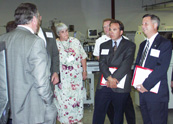UNMC’s experts in bioterrorism preparedness on Tuesday showed a statewide policy group how the university can support the state’s efforts to secure the homeland.
 Members of the Nebraska Homeland Security Policy Group heard from UNMC experts throughout Tuesday morning, then visited Lab-InterLink and the Peter Kiewit Institute Tuesday afternoon.
Members of the Nebraska Homeland Security Policy Group heard from UNMC experts throughout Tuesday morning, then visited Lab-InterLink and the Peter Kiewit Institute Tuesday afternoon.
Among the visitors to campus was Lt. Gov. Dave Heineman, whom Gov. Mike Johanns has appointed statewide coordinator of homeland security. The policy group held a meeting at the noontime break of Tuesday’s visit.
“I wanted to meet in Omaha so that all of the group’s members could see the expertise at UNMC,” said Heineman, who at an earlier meeting had heard from UNMC experts about the campus’ expertise in bioterrorism preparedness.
|
|
UNMC Chancellor Harold M. Maurer, M.D., who is a member of the statewide policy group, said that UNMC has vast resources that can assist the state in its bioterrorism preparedness.
“Our researchers and faculty are known nationwide, and since Sept. 11, they have been called upon by the federal government to share their expertise,” Dr. Maurer said. “We would like to share this expertise to help the state in any way we can. It’s certainly a continuation of our mission to serve the entire state.”
Steve Hinrichs, M.D., UNMC professor and director of the Nebraska Public Health Laboratory, said Nebraska already is unique in that the NPHL is one of the few state public health labs located on a university campus.
“This state is known for working together with its university — and using the resources the university can provide — to find the best results,” said Dr. Hinrichs, UNMC’s other representative on the statewide policy group. “In the area of bioterrorism preparedness, we certainly have a great deal of expertise and other resources that we can provide.”
In addition to listening to presentations from Dr. Maurer and Dr. Hinrichs, the policy group visited the DNA testing laboratory at UNMC; toured a possible isolation treatment facility for people infected by nuclear, biological and chemical agents; and listened to presentations from Paul Fey, Ph.D., on emerging infectious diseases; Peter Iwen, Ph.D., on identifying microbial pathogens with a DNA microchip; Oksana Lockridge, Ph.D., on protection against chemical nerve agents; Phil Smith, M.D., on collaborative education; Yvette Holly, Ph.D., on information technology services at UNMC; Kolene Kohll, on the Health Professions Tracking Center; and Mark Rupp, M.D., on the proposed isolation facility.
Photo: Rod Markin, M.D., Ph.D., chief executive officer of Lab-InterLink, visits with members of the Nebraska Homeland Security Policy Group during their visit to the lab automation business on Tuesday. From left are, Cindy Newsham of Nebraska Emergency Management Agency; State Fire Marshal Ken Winters (partially hidden); Col. Tom Nesbitt of the Nebraska State Patrol; and Lt. Gov. Dave Heineman.